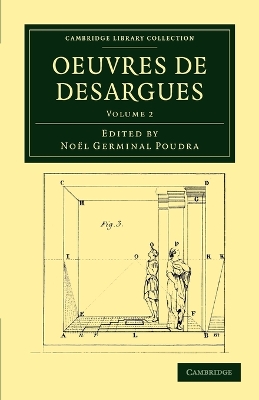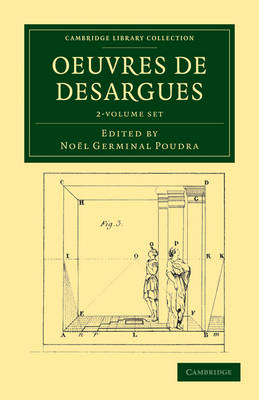Cambridge Library Collection - Mathematics
1 primary work • 4 total works
Volume 1
The French mathematician and engineer Gérard Desargues (1591–1661) was one of the founders of projective geometry. Desargues' theorem is named in the honour of this prolific writer of treatises on geometry and its application to the arts and architecture. His important writings, which had been lost, were published in 1864 by the mathematician and scientific historian Noël-Germinal Poudra (1794–1894). Poudra's two-volume edition, republished here, reveals the major role played by Desargues in the scientific debates of the seventeenth century. It includes a biography of Desargues, in which Poudra discusses his role as architect, as well as his influence on famous scientists of his time including Pascal and Descartes. Volume 2 contains Poudra's analysis of the works of the engraver Abraham Bosse (1603–76), which develop some of Desargues' ideas. It also reproduces some of the - often critical - responses to Desargues' work by his contemporaries.
The French mathematician and engineer Gerard Desargues (1591-1661) was one of the founders of projective geometry. Desargues' theorem is named in the honour of this prolific writer of treatises on geometry and its application to the arts and architecture. His important writings, which had been lost, were published in 1864 by the mathematician and scientific historian Noel-Germinal Poudra (1794-1894). Poudra's two-volume edition of his treatises, republished here, reveals the major role played by Desargues in the scientific debates of the seventeenth century. It includes a biography of Desargues, in which Poudra discusses his role as architect, as well as his influence on famous scientists of his time including Pascal and Descartes. Poudra also reproduces some of the - often critical - responses to Desargues' work by his contemporaries.
The French mathematician and engineer Gerard Desargues (1591-1661) was one of the founders of projective geometry. Desargues' theorem is named in the honour of this prolific writer of treatises on geometry and its application to the arts and architecture. His important writings, which had been lost, were published in 1864 by the mathematician and scientific historian Noel-Germinal Poudra (1794-1894). Poudra's two-volume edition, republished here, reveals the major role played by Desargues in the scientific debates of the seventeenth century. It includes a biography of Desargues, in which Poudra discusses his role as architect, as well as his influence on famous scientists of his time including Pascal and Descartes. Volume 1 contains the majority of Desargues' treatises, including 'Perspective' (1636), followed by an analysis by Poudra, and the 'Traite des Coniques' (1639), with a lexicon of the scientific terms used.
The French mathematician and engineer Gerard Desargues (1591-1661) was one of the founders of projective geometry. Desargues' theorem is named in the honour of this prolific writer of treatises on geometry and its application to the arts and architecture. His important writings, which had been lost, were published in 1864 by the mathematician and scientific historian Noel-Germinal Poudra (1794-1894). Poudra's two-volume edition, republished here, reveals the major role played by Desargues in the scientific debates of the seventeenth century. It includes a biography of Desargues, in which Poudra discusses his role as architect, as well as his influence on famous scientists of his time including Pascal and Descartes. Volume 2 contains Poudra's analysis of the works of the engraver Abraham Bosse (1603-76), which develop some of Desargues' ideas. It also reproduces some of the - often critical - responses to Desargues' work by his contemporaries.


